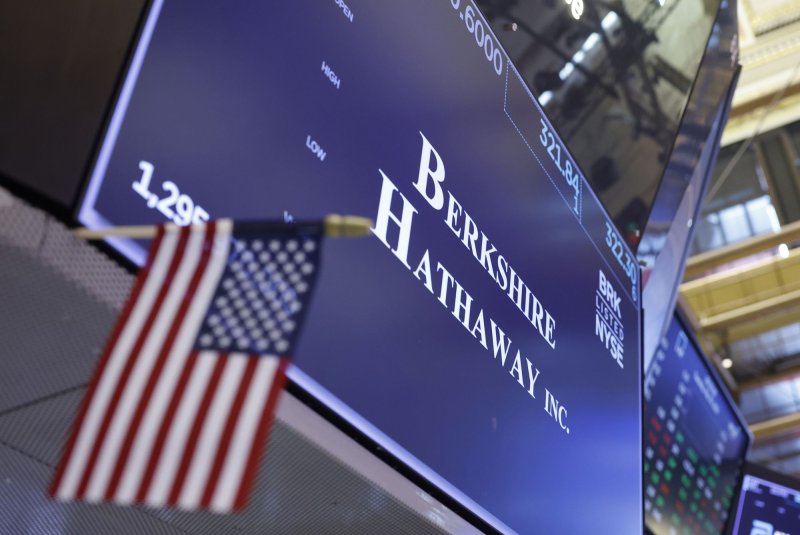The Berkshire Hathaway logo is posted on a screen on the floor of the New York Stock Exchange on Wall Street in New York City on May 30. File photo by John Angelillo/UPI |
License Photo
Nov. 28 (UPI) -- Charlie Munger, a billionaire who became Warren Buffet's most trusted adviser at Berkshire Hathaway, is dead at 99.
Munger met Buffett in 1959 when Munger was in Omaha for his father's funeral. Munger and Buffett struck up a fast friendship over dinner.
Buffett told CNBC in 2021 that after their first meeting, he knew "I'm not going to find another guy like this .... We just hit it off."
"Berkshire Hathaway could not have been built to its present status without Charlie's inspiration, wisdom and participation," Buffett said of Munger in a statement.
Munger had already become tremendously wealthy before he met Buffet but the two would form a business alliance and friendship that endured for decades.
Earlier this year, Forbes reported Munger's fortune was estimated to be about $2.3 billion, which is substantial by the average person's standards, but vastly smaller than Buffett's fortune, which is estimated at more than $100 billion.
Munger was an architect by trade and later became a real estate attorney, chairman and publisher of the Daily Journal Corp., a member of the Costco board of directors, and a philanthropist.
His business associate and friend Buffet credited Munger with teaching him important lessons about investing, especially when it came to buying underperforming companies with the goal of turning them into profitable ventures. Buffet had to that point subscribed to the "buy low sell high" theory, finding underperforming companies and hoping he could turn them around.
"He weaned me away from the idea of buying very so-so companies at very cheap prices, knowing that there was some small profit in it, and looking for some really wonderful businesses that we could buy in fair prices," Buffett said of Munger in 2016.
Perhaps the first and best example of that came in 1972 when Munger convinced Buffet to sign off on Berkshire's $25 million purchase of See's Candies, even though the confectioner had only made about $4 million in profits. Since Buffet's takeover, the candy maker has earned more than $2 billion in sales for Berkshire and become one of the most well-known names in candy.
Munger described his philosophy differently at the 1998 Berkshire shareholder meeting: "It's not that much fun to buy a business where you really hope this sucker liquidates before it goes broke," he said of the idea of turning around an underperforming company.
Munger was known for his dry sense of humor and was often the more understated of the partners. When Buffet would offer long and detailed answers to questions from stockholders, investors or reporters, Munger would wryly quip "I have nothing to add."
Munger lost his left eye and wore thick glasses as result of complications from cataract surgery in 1980. He kept his investing philosophy, advice, and responses somewhat academic and simple.
"I have a friend who says the first rule of fishing is to fish where the fish are. The second rule of fishing is to never forget the first rule," Munger told the thousands of people gathered for Berkshire's 2017 meeting, then at the age of 93. "We've gotten good at fishing where the fish are."
He often said there wasn't a single answer to making investment choices, but rather a confluence of factors that merged to drive the psychology of investing, known in psychology circles as the "lollapalooza effect."














